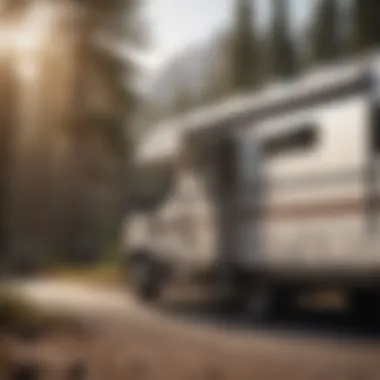Understanding Affordable RV Insurance Options


Intro
Selecting the right insurance for a recreational vehicle (RV) involves careful planning and consideration. Understanding the cheapest RV insurance requires not only knowledge about different coverage options but an appreciation of specific factors that contribute to pricing. This guide aims to clarify options and explore the nuances influencing costs. Maximizing cost-efficiency while ensuring adequate coverage can empower RV owners in their decision-making process.
Coverage Options
When contemplating RV insurance, exploring coverage options is paramount. Various types exist, tailored to individual needs, usage patterns, and preferences. Choosing the suitable coverage can significantly impact both protection and financial outlay.
Types of Coverage Available
RV insurance generally comprises several coverage options:
- Liability Coverage: This is essential for protection against costs related to injuries or damages caused to others in an accident where the RV driver is at fault.
- Comprehensive Coverage: This protects against damages not related to accidents, including theft, vandalism, and natural disasters.
- Collision Coverage: This covers the costs of repairs or replacement if the RV is damaged in an accident.
- Personal Injury Protection: This covers medical expenses for drivers and passengers following an accident, regardless of who was at fault.
Each of these options has distinct advantages, ensuring that RV owners can select ones aligning with their needs and circumstances.
Liability Coverage Explained
Liability coverage holds a crucial role in RV insurance. It not only covers bodily injury liability but also property damage liability. If an RV causes damage, the insurance helps cover repair costs or medical expenses to those affected. This coverage is often legally required, emphasizing its importance. Without adequate liability coverage, RV owners expose themselves to significant financial risk in the case of an accident.
Key Considerations
Choosing the most affordable RV insurance necessitates evaluating several key factors that influence costs:
Factors to Assess When Choosing Insurance
- Type of RV: The make, model, and age of the RV can affect insurance rates. Luxury or larger models usually result in higher premiums.
- Usage Frequency: The more frequently an RV is used, the higher the probability of accidents. Regular use can lead to increased premiums.
- Driving History: A clean driving record can often result in lower rates as compared to a history marked with accidents or violations.
- Location: Insurance companies consider where the RV is parked or stored. Areas prone to theft or natural disasters may see increased premiums.
Understanding Policy Limits
It is vital to comprehend policy limits. Insurance policies define maximum amounts that the insurer will pay for covered claims. Understanding these limits helps RV owners avoid underinsurance. For example, if liability coverage limits are too low, significant damages may lead to out-of-pocket expenses. Reviewing these limits and adjusting coverage accordingly can safeguard RV owners financially, ensuring adequate protection against potential risks.
"Choosing the right RV insurance requires more than just looking at prices. Analyze coverage options, assess personal needs, and compare rates to make an informed decision."
By focusing on coverage options and key considerations, RV owners can better navigate the complexities of RV insurance. The insights offered in this comprehensive guide prepare them to engage in comparison shopping and identify policies that align with their expectations and financial goals.
Preface to RV Insurance
RV insurance occupies a critical space in the domain of vehicle protection. It extends beyond typical auto insurance to cover the unique aspects of recreational vehicles. This section establishes a crucial framework for understanding why RV insurance is relevant and necessary. The decision to own an RV often aligns with the desire for adventure, flexibility, and travel. However, it introduces specific risks that demand tailored coverage.
Understanding RV insurance helps owners safeguard their investment. An RV is not only a vehicle; it serves as a mobile home for many. This dual purpose amplifies the need for appropriate coverage. Moreover, as recreational vehicles can vary significantly in size and type, the insurance policies must reflect these differences.
The benefits of RV insurance are manifold. It can protect owners from unexpected damages, collisions, and liability claims. Additionally, it provides a financial cushion in the event of theft or vandalism. For owners who plan to travel extensively, comprehensive coverage is essential. It ensures peace of mind while on the road, allowing for a greater focus on enjoying travel experiences.
In summary, diving into the specifics of RV insurance equips owners with the knowledge necessary for making informed decisions. This is especially important given the substantial investments involved in purchasing and maintaining an RV. The following sections delve deeper into the definitions and necessities surrounding RV insurance, building the foundation for understanding how one can find the most affordable options available.
Understanding Insurance Premiums
Insurance premiums represent a fundamental component of RV insurance. Understanding how these premiums are calculated is essential for making informed decisions. Recognizing the factors that influence premiums helps RV owners identify areas for potential cost savings. An effective approach to navigating this complex landscape involves analysis and comparison.
Insurance premiums are not set arbitrarily; they are determined by various factors that indicate risk levels. When seeking affordable RV insurance, grasping this concept proves beneficial. Engaging with these elements not only fosters financial awareness but also promotes strategic planning. By understanding premiums, RV owners can better tailor their coverage options, ultimately optimizing their savings.
What Influences Insurance Costs
Multiple aspects come into play when determining the cost of insurance. Each factor carries its weight and contributes significantly. Some of the primary elements include the type of RV, driving history, location, and usage patterns. Therefore, a comprehensive understanding of these factors is critical for those looking to find the cheapest RV insurance.
Factors Affecting RV Insurance Premiums
Type and Size of RV
The type and size of an RV play essential roles in determining insurance costs. Larger and more luxurious models generally attract higher premiums. This is due to their increased value and the potential costs associated with repairs. For instance, a Class A motorhome typically costs more to insure than a pop-up camper. As a beneficial choice, understanding the relationship between RV types and insurance costs allows owners to make prudent decisions about their vehicle selections. The unique features of a larger RV can provide comfort and versatility, but it can also lead to increased financial responsibilities.
Driving History


Driving history is another significant aspect influencing insurance costs. Insurers analyze the driving records of applicants to assess risk. Drivers with clean records may benefit from lower premiums. In contrast, a history of accidents or traffic violations can result in elevated costs. Maintaining a good driving history can be a wise choice. It not only offers the potential for discounted premiums but also encourages safe driving habits. Ultimately, it reflects the personal responsibility of the RV owner.
Location
Location greatly impacts insurance premiums. Regions with higher rates of accidents, theft, or natural disasters typically see increased insurance costs. For example, urban areas may present more risks than rural settings. Understanding how geographic location plays a role in insurance allows owners to consider the implications of their residential choices and plan accordingly. This factor is especially relevant when assessing the insurance landscape, as it highlights potential financial differences across varying locales.
Usage Patterns
Usage patterns of an RV can also determine insurance costs. Vehicles used regularly for travel may carry different risks than those utilized sporadically. Regular use often means a greater chance of accidents, which can lead to higher premiums. Conversely, if an RV is primarily used for seasonal trips, insurers may adjust the rates. Analyzing these patterns provides insight into which usage styles could result in more economical coverage options. This strategic understanding can help align an owner’s needs with their insurance plans.
"Understanding the factors affecting RV insurance premiums is vital for owners seeking affordable options."
Being well-informed equips potential policyholders to engage more actively with their insurance processes. By recognizing these considerations, RV owners can adopt a proactive approach to understanding their insurance premium calculations. This knowledge forms the foundation for navigating the RV insurance market.
Types of Coverage Available
Understanding the various types of coverage available is essential for RV owners who are looking to secure the cheapest yet adequate insurance. Different coverages serve distinct purposes and can significantly impact the overall cost of the policy. Therefore, assessing what each type offers helps make informed decisions that align with individual needs and budget.
Liability Coverage
Liability coverage is a fundamental aspect of RV insurance. It protects the policyholder from financial loss in the event that they are held responsible for causing an accident. This includes damage to other vehicles or property, as well as medical expenses incurred by others as a result of the incident. Without sufficient liability coverage, RV owners face substantial risks, potentially leading to severe financial burdens.
"Liability coverage not only protects your finances but is often a legal requirement for RV operation."
When choosing liability coverage, RV owners should consider the minimum requirements set by their state. However, opting for higher limits offers added security, particularly given the increasing costs of medical care and vehicle repairs.
Comprehensive and Collision Coverage
Comprehensive and collision coverage provides additional protection beyond liability.
- Comprehensive coverage covers damage to the RV from non-collision incidents such as theft, vandalism, or natural disasters. This is particularly relevant for newer or more valuable RVs, where repair or replacement costs can be substantial.
- Collision coverage, meanwhile, covers the costs associated with damage resulting from a collision, whether it is with another vehicle or an object.
Assessing the value of the RV plays a crucial role in deciding whether to include these coverages. For instance, older models might not warrant comprehensive coverage, as the cost of the policy could exceed the potential payout in the event of a loss. On the other hand, newer or higher-value RVs often benefit from the security that these coverages provide.
Personal Injury Protection
Personal Injury Protection (PIP) is another critical type of coverage offered in many states. This coverage assists with medical expenses, lost wages, and other related costs for the insured or passengers within the RV after an accident, regardless of fault. While liability covers damages to others, PIP focuses on the welfare of those inside the RV.
Opting for PIP can be particularly valuable for families or those who frequently travel with many passengers. Understanding the specifics of PIP policies is vital, as coverage levels can vary significantly.
Identifying the Cheapest RV Insurance
Identifying the cheapest RV insurance is a critical step for anyone considering or currently owning an RV. The upfront cost of purchasing an RV is often significant. Thus, finding affordable insurance can help manage ongoing expenses. Selecting a policy that balances cost and coverage ensures you are protected without overspending.
When searching for the cheapest RV insurance, several elements come into play. Understanding your needs and comparing available options can save money while still providing essential protection. Adequate knowledge of your coverage needs is crucial, as underinsurance can lead to considerable financial risk.
Steps to Find Affordable Options
To find affordable RV insurance, start by assessing your individual requirements. This includes the type of RV you own, how you plan to use it, and any specific coverage needs. Consider the following steps:
- Gather Information: Collect details about your RV, such as its make, model, year, usage, and any safety features.
- Evaluate Coverage Needs: Determine what type of coverage you require. This may involve liability protection, comprehensive coverage, or additional options like roadside assistance.
- Request Quotes: Reach out to various insurance providers for quotes based on your unique profile. Specify the same coverage parameters in each request to ensure accurate comparisons.
- Annual Review: Regularly review your insurance policy each year or when significant changes occur in your life or RV usage.
Use of Online Comparison Tools
In today’s digital age, online comparison tools have become essential for finding the most affordable RV insurance options. Using these tools can simplify your search process and clarify what different providers offer.
These platforms help you:
- Compare Quotes: Such websites enable you to input your information and receive multiple quotes from various insurers quickly. Having numerous options allows for easier side-by-side comparison.
- Learn about Insurers: In addition to costs, you can gather insights about different insurance companies, including their reputation, customer service ratings, and coverage options.
- Save Time: Instead of independently contacting various companies, comparison tools consolidate the work into one location, freeing up your time for other tasks.
"Using online comparison tools can streamline your insurance search, providing a clear view of what is available to you in the market."
By strategically utilizing these steps and tools, RV owners can significantly cut their insurance costs without sacrificing essential coverage.


Discount Opportunities for RV Insurance
Identifying discount opportunities for RV insurance is crucial for many owners seeking to reduce costs while ensuring adequate coverage. Understanding these discounts can lead to significant savings, making the RV lifestyle more accessible. Additionally, they provide motivation for responsible behaviors that not only lower expenses but also enhance safety on the road.
Bundling Policies
Bundling policies refers to the practice of purchasing multiple insurance products from one provider, often leading to lower rates. For RV insurance, this often means combining coverage for home, auto, and RV under one insurer. Insurers frequently reward customers who bundle by offering discounts that can range from 10% to 20%, depending on the provider and the type of policies involved. This not only helps in saving money but also simplifies the management of various policies since everything is consolidated into a single company. Engaging with one insurer can also help in building a stronger customer relationship, potentially leading to further discounts in the future.
Safe Driver Discounts
Safe driver discounts are another important way to lower RV insurance costs. Insurers typically offer discounts for those with clean driving records. If you have no accidents or traffic violations over a period of time, you may qualify for a discount. This is based on the premise that a history of safe driving indicates lower risk to the insurer. Various companies may have their unique criteria for defining a safe driver, so it's essential to inquire about these specifics when shopping for RV insurance. Keeping a clean driving record not only benefits you financially but also promotes responsible driving habits generally.
Seasonal Usage Discounts
Many RV owners do not use their vehicles year-round. In such cases, some insurance companies offer seasonal usage discounts. This discount allows owners to lower their premium costs during periods when the RV is not in use. Essentially, this means paying a lower rate for coverage when the RV is parked and not being driven. The specifics of these arrangements can differ significantly between providers. As a result, communicating your RV usage patterns can be beneficial when negotiating rates. This strategy is particularly useful for those who store their RV during off-peak seasons and only use it sporadically during the warmer months.
"Potential discounts for bundling, maintaining a clean driving record, and understanding usage seasons can lead to significant savings on RV insurance."
In summary, considering discounts related to bundling policies, keeping a safe driving record, and recognizing the benefits tied to seasonal usage can greatly influence the overall cost of RV insurance. Before finalizing you'll need to assess which discounts are available based on your unique situation and demands.
Common Mistakes to Avoid
When it comes to securing affordable RV insurance, several common mistakes can lead to wasted funds or insufficient protection. Avoiding these pitfalls is crucial for any RV owner looking to ensure both value and coverage adequacy. Understanding these mistakes can facilitate better decision-making and ultimately save money.
Underinsuring the RV
Underinsuring an RV is a frequent mistake that can have dire financial consequences. Many owners opt for the lowest possible premium without considering the full implications. This often results in purchasing a policy that does not cover the full replacement cost of the vehicle. In case of theft or a severe accident, the amount paid out could be significantly less than what the RV is worth.
Moreover, owners may underestimate the overall value of their RV, including aftermarket parts and enhancements. It's important to take inventory of all the features and customizations that add to the value. By underinsuring, one risks facing substantial out-of-pocket expenses during unforeseen events, nullifying the purpose of having insurance in the first place.
Overlooking Coverage Needs
Another mistake is overlooking specific coverage needs. Each RV owner's situation is unique, and their insurance should reflect that individuality. Many policies have standard coverage that might not include critical protections, such as roadside assistance or personal belongings coverage.
Failing to identify necessary add-ons can lead to gaps in protection. For instance, those who frequently travel in areas known for severe weather may benefit from comprehensive coverage that addresses storm damage. It is essential to thoroughly assess personal usage patterns, as well as anticipate potential risks linked to RV ownership.
In summary, unequal attention to coverage can leave RV owners vulnerable.
Additionally, understanding the nuances of coverage options is vital. Some owners may not be aware of limitations associated with generic policies. Comprehensive review and consultation can help identify essential coverage that aligns closely with personal needs, fostering a more secure investment in RV insurance.
Identifying these mistakes can change outcomes significantly, ensuring that RV owners not only save costs but also safeguard their asset from possible risks.
State-Specific Insurance Requirements
When discussing RV insurance, it is imperatively important to understand state-specific insurance requirements. Each state in the United States has its own set of regulations that govern the minimum coverage needed for RVs. These requirements can greatly influence the type of insurance you must carry and the overall cost of your premiums. Ignoring these regulations may not only expose you to significant financial risks but also lead to legal issues.
Understanding State Regulations
State laws dictate various aspects of RV insurance, including but not limited to:
- Minimum Liability Coverage: Most states require a minimum amount of liability insurance. This coverage protects you financially if you cause an accident that injures others or damages their property. Failing to meet your state’s minimum requirement can result in penalties, fines, or even the loss of your driving privileges.
- Personal Injury Protection: Some states mandate personal injury protection (PIP) coverage. PIP pays for medical expenses and lost wages for you and your passengers after an accident. Depending on the state, failure to have adequate PIP can lead to severe legal issues.
- Uninsured/Underinsured Motorist Coverage: This coverage is also required in some states, ensuring you are protected if you are in an accident caused by someone with little or no insurance. Not having this can leave you financially vulnerable.
Each state reviews and updates its regulations periodically. Therefore, staying informed about these changes is crucial for RV owners.
How Location Affects Insurance Costs
Location is a critical factor in determining the cost of RV insurance. Different regions have varying levels of risk associated with hazards such as theft, accidents, and natural disasters. Consider the following:
- Urban vs. Rural Areas: Insuring an RV in a densely populated urban area typically costs more than in rural regions. This is largely due to higher accident rates and increased incidents of theft in cities.
- Weather Conditions: States prone to severe weather events, such as hurricanes or heavy snowfall, often have higher insurance premiums. Insurance companies factor these risks into their pricing models.
- Traffic Laws and Rates: Some states are more litigious than others. If you live in a state with a high rate of accidents or insurance claims, your premiums may be elevated as a result.
Ultimately, understanding the geographical implications on insurance can help RV owners make informed decisions when selecting policies. Local insurance agents can provide detailed insights into how state regulations and location influence coverage and costs.
The Role of Insurance Agents


Insurance agents are pivotal players in the landscape of RV insurance. They serve as the link between the insurance companies and potential policyholders. Their expertise can significantly ease the process of obtaining coverage that suits specific needs. Grasping the nuances of RV insurance can be challenging. An insurance agent can simplify this by providing tailored advice based on individual circumstances.
Consulting an agent is often a wise move when you're not sure of your insurance needs.
Agents not only help in finding suitable coverage but also aid in navigating the complexities of differing policies. Their familiarity with the intricacies of various insurance products ensures that you are comparing apples to apples. Here is a look at when it might be best to consult an agent:
When to Consult an Agent
One of the vital moments to reach out to an insurance agent is at the onset of buying an RV. At this stage, considerations include the type and size of the vehicle, intended usage, and potential risks. Agents can provide insights into the most suitable types of coverage needed without overwhelming you.
It’s also beneficial to consult an agent if you:
- Experience changes in your circumstances, like moving to a new state.
- Upgrade or change your RV, which could alter your coverage needs.
- Seek clarity on any aspect of your insurance policy, like claims or exclusions.
- Feel unsure about the adequacy of your current coverage.
Benefits of Professional Guidance
Engaging with an insurance agent comes with several advantages. First, agents often have access to a range of providers and can help you compare different quotes effectively. This comparison is crucial as rates and coverage can vary significantly among providers.
Additional benefits include:
- Expertise: Agents have extensive knowledge of the RV insurance market and can guide you toward options that you might not be aware of.
- Tailored Advice: They can offer personalized solutions based on your situation, ensuring you get the best value for your money.
- Claim Assistance: Navigating claims can be daunting. An insurance agent can assist you in filing your claim properly, increasing the chance of a favorable outcome.
- Up-to-Date Information: Insurance regulations can change. Agents stay informed about new laws that may affect your coverage or costs.
In summary, although seeking the lowest price is critical, understanding what you are paying for is equally important. Consulting with an insurance agent can bridge this gap and ensure you secure optimal coverage for your RV.
Comparing Insurance Providers
In the landscape of RV insurance, understanding how to compare providers is a pivotal move for any RV owner. The essence of this process lies in not just obtaining quotes but ensuring that the coverage meets your individual needs. Each insurance provider presents a different array of options, benefits, and pricing structures that can significantly affect your bottom line. Therefore, comparing insurance providers is essential to find a balance between affordability and quality.
When embarking on this journey of comparison, it is crucial to scrutinize the coverage policies offered by each provider. Look for companies that provide comprehensive liability coverage, collision and comprehensive insurance. These elements are fundamental to safeguarding your investment in the RV. Failing to recognize which aspects are included can lead to underinsurance, which could have financial consequences in the event of an accident.
In addition, the reputation of the insurance provider is paramount. A well-reviewed company often indicates a reliable service. This can be gauged by looking into financial stability and claim processing efficiency. Ultimately, the goal is to select a provider that you can trust during critical moments, when you need them most.
"Researching and comparing insurance providers is like assembling a safety net that protects your RV investment."
What to Look for in Providers
When comparing insurance providers, several specifics come into play:
- Coverage Options: Assess if the provider offers various coverage types. You might need additional coverage like roadside assistance or personal belongings coverage.
- Premium Rates: Compare the cost of premiums, but do not be swayed solely by lower rates. Evaluate what you are getting.
- Discount Opportunities: Investigate any discounts available, like bundling with other insurance policies or safe driver discounts.
- Claims Process: Look for how straightforward the claims process is, as encountering a complicated system may lead to frustration.
- Customer Service: Prioritize providers known for good customer service. You want to ensure that assistance is available when needed.
Evaluating Customer Reviews
Customer reviews serve as an invaluable tool when comparing insurance providers. These reviews often reveal insights into actual experiences from policyholders, offering a glimpse into how the application and claims process unfolds. Look for patterns in the feedback—both positive and negative. A high number of consistent complaints regarding claims delay, or poor customer service, can be indicative of underlying issues.
Additionally, consider the reviews in context. A few negative comments may not be alarming if the majority of feedback is positive. Websites like Reddit or consumer review sites can provide unfiltered opinions from RV owners who have navigated similar challenges.
In summary, the analysis of customer reviews can aid significantly in decision-making. Prior knowledge can assist you in steering clear of problems that may arise with certain providers. Observing the collective experience of others can foster more informed choices, ultimately leading to a satisfying insurance experience.
Final Thoughts on RV Insurance
Navigating the complexities of RV insurance is pivotal for both seasoned travelers and newcomers to the RV lifestyle. This final section consolidates the key insights surrounding RV insurance and emphasizes the necessity of being well-informed. Throughout this article, aspects such as coverage options, premium factors, and comparison strategies have been scrutinized. Understanding these elements is not merely an academic exercise; it provides tangible benefits for RV owners.
Importance of Research
Research acts as the foundation when seeking RV insurance. The insurance market is vast, and choices can drastically impact coverage and costs. A well-researched approach allows RV owners to:
- Identify the finest insurance products for their individual needs. This ensures tailored coverage.
- Understand the specific requirements and regulations in their respective states.
- Recognize available discount opportunities, such as bundling multiple policies.
Thorough research enables consumers to filter options that not only meet legal standards but also provide sufficient protection against potential risks while traveling. An informed decision is often more cost-effective and leads to satisfactory coverage.
Choosing the Right Coverage for Your Needs
Selecting appropriate coverage is crucial in ensuring that the investment in an RV is adequately secured. Different RVs come with diverse usage patterns and risk factors. Therefore, it is essential to assess specific coverage types that cater to personal travel habits and preferences. Here are some points to consider:
- Liability coverage is fundamental, protecting against legal claims from accidents involving other parties.
- Comprehensive and collision coverage is vital for covering damages to the RV itself, whether from an accident or other risks.
- Personal Injury Protection can offer support for medical expenses incurred by RV occupants in case of an accident.
Choosing the right combination of coverage types is indispensable. It ensures that RV owners are not left vulnerable in unexpected situations. Balancing desired coverage levels with budget constraints will require some effort, but the payoff can be significant, reducing financial stress during travels.
Ultimately, the journey towards securing RV insurance is about understanding your specific needs and making informed choices that prioritize both safety and peace of mind.



